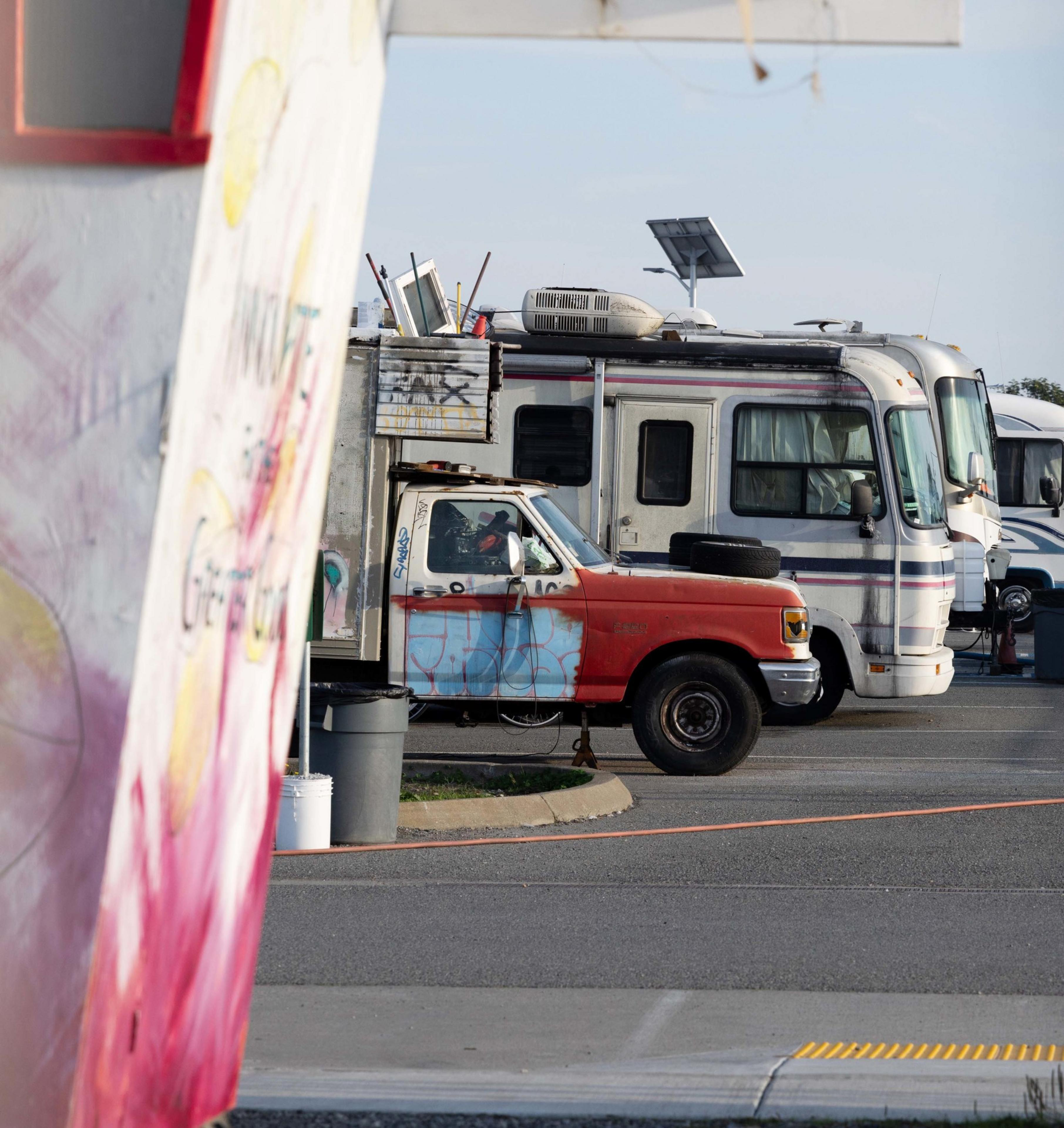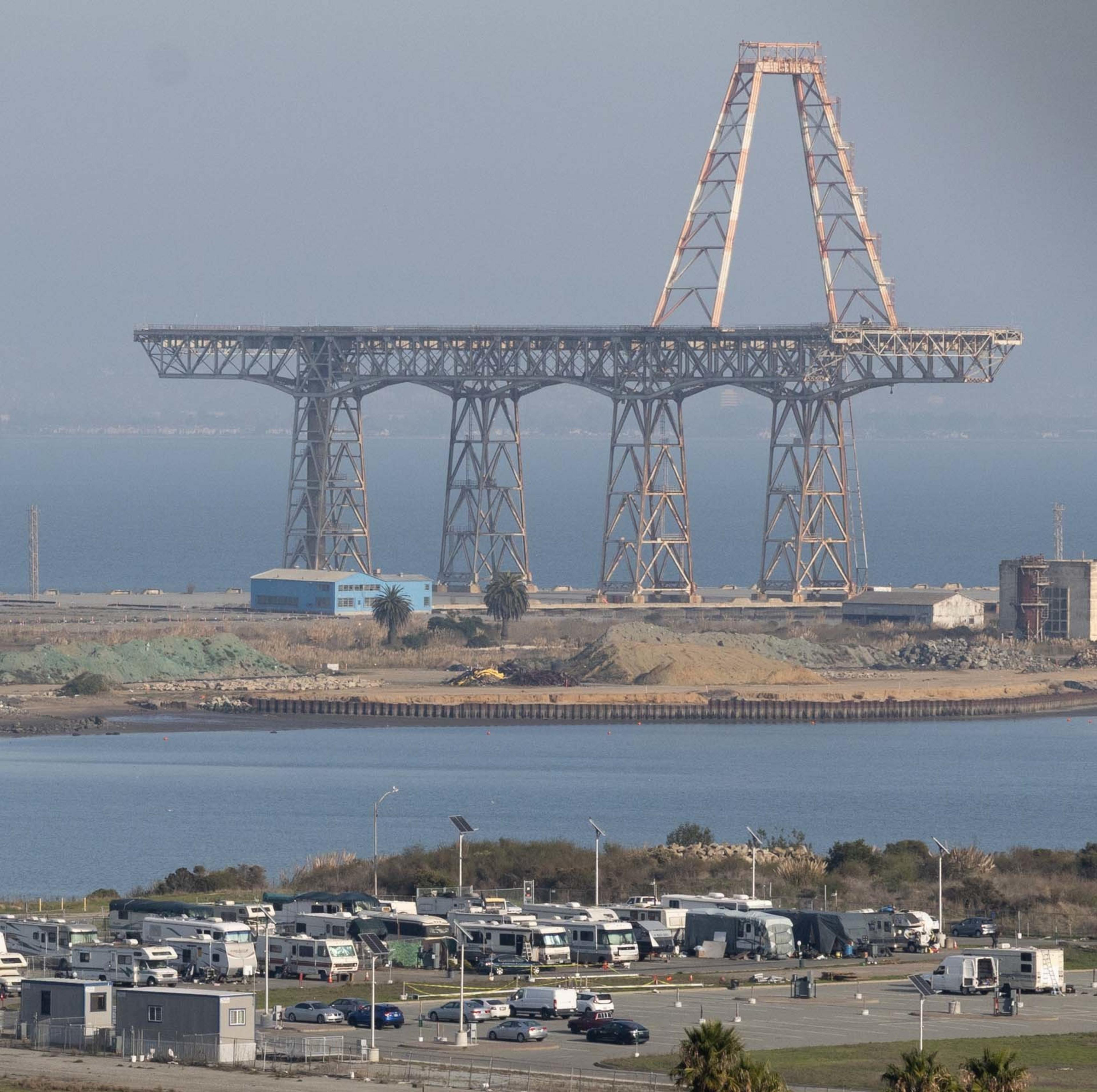Paul Reyes was finally getting his life together.
His spot at a city-funded RV site came with free food, laundry services, and therapy. He worked to tackle his drug addiction and felt ready to reenter the workforce for the first time in his 10 years of homelessness.
“All that’s been derailed now,” Reyes said.
City officials said last week they plan to close the Bayview Vehicle Triage Center, a safe-parking site whose three-year tenure has been marred by lawsuits, bitter complaints from residents, and an ongoing federal investigation.
The site, which was supposed to serve 120 RVs at a time, housed just 35. Residents have until Valentine’s Day to accept shelter or leave, the San Francisco Chronicle first reported (opens in new tab).
That’s nine months before the city’s lease on the Candlestick Point property is set to expire.
The closure will cap a saga that even city officials have acknowledged was a largely ineffective — and costly — attempt to mitigate San Francisco’s vehicular homelessness crisis. It also leaves the site’s vulnerable residents scrambling to find a new place to live.

A spokesperson for San Francisco’s Department of Homelessness and Supportive Housing did not say why the city is shuttering the property early but noted that it was originally intended as a “temporary two-year solution to address vehicular homelessness.”
The project has long been under scrutiny for its high price tag. City documents show that in 2023, the annual cost to keep one vehicle at the site was $140,000. That was “by far the most expensive homeless response intervention,” city analysts wrote (opens in new tab).
At that price, you could house a resident in a “Grand Deluxe King Room” at the Westin St. Francis for a year — with a towering city view and $100 per diem. But the site’s residents say it’s a far cry from an upscale Union Square hotel.
For one thing, there are the rodents.
Ramona Mayon, who has lived at the site since August 2022, said one morning she found a dead mouse under her stove.
She said a mechanic told her mice had nested in her RV’s engine compartment and may have damaged the vehicle’s wiring. Photos viewed by The Standard show dead rodents strewn across the RV site.
Then there’s the electricity problem.
The site, which opened in January 2022, didn’t gain permanent power until Oct. 29 this year thanks to problems connecting it to the PG&E grid. That set the stage for a 2023 lawsuit in which a citizens group accused the city of running 16 unauthorized diesel generators at the site.
The Homelessness Department didn’t answer questions about how much the city spent to electrify the site or what it plans to do with the property for the remainder of the lease.
Meanwhile, Aaron Wilson, who has lived there since March, said there is daily friction between residents and the staff of Urban Alchemy, the nonprofit charged with running the site.
“It’s a prison camp,” Wilson said, referring to the fact that residents aren’t allowed to have visitors.
Wilson and two other residents who spoke to The Standard referenced an instance in which a staffer appeared to mock a deaf resident during a heated exchange.
At one point, residents sought to form a tenants union to fight what they called “shameful” quality of life.
“Stop this communist regime that violates our BASIC HUMAN RIGHTS,” one resident wrote in February, Bay City News (opens in new tab) reported.
“We have met all of the stated contract goals that the city asked of us at the Bayview Vehicle Transit Center,” Urban Alchemy official Kirkpatrick Tyler said in an email. “In line with shelter best practices nationwide, we’ve adopted a no outside visitor policy to protect both the residents at the transit center and our staff.”
But the biggest point of friction stems from the fact that the U.S. Department of Housing and Urban Development is investigating the site, Wilson said.
Kelly Hughs, a resident since November 2022, said she sparked the probe with a complaint that she couldn’t access the site’s shower trailer, or the dog park and gazebo, with her wheelchair.
“This is an open investigation, and we cannot comment further,” a HUD spokesperson said in an email.
Hughs said Urban Alchemy removed the dog park and gazebo after she complained; the amenities were no longer at the site when The Standard visited this week.
“They told everybody, ‘It’s because the [American Disabilities Act] person can’t use it,’” Hughs said of the staffers. “That’s retaliation.”

An Urban Alchemy employee at the site described residents who’ve complained about alleged mistreatment and ADA violations as “entitled” and “troublemakers.”
“You’re supposed to stay here for six months, get your shit together, then move on to the next,” said the employee, who is not authorized to speak to the press and didn’t want to be named. “They’re just leeching off the resources and preventing others from using them. And then they complain that they’re being forced to leave.
“Basically, you’re just squatting in your mobile home on our property,” the employee added.
The property is owned by the state of California.
“Our team has gone out of the way to work closely with the residents at the Transit Center to ensure that their spots are secure,” Tyler said via email, “even if there are minor mistakes because we know how important it is to provide these residents with a more stable situation than being on the streets.”
‘Everything was falling into place’
It wasn’t supposed to be like this.
City officials originally envisioned a site offering 120 RV spots where residents could access showers, therapists, toilets, and electrical and sewage hookups for their vehicles. They wouldn’t have to worry about getting ticketed, and the site would connect them with mechanics who’d fix their motor homes for free.
It’d be a place for homeless residents to regroup — and a way for the city to get scores of lumbering vehicles off Bayview streets.
But the city was never able to remove the “desired” number of RVs off the street “because the site capacity has been so much lower than originally planned,” a spokesperson for the city’s Homelessness Department wrote in an email.
City contracts viewed by The Standard note that the site couldn’t reach capacity until it was fully electrified — which didn’t happen until almost three years in.

Just 31 people from the 132 households that have cycled through the site have entered long-term housing, temporary housing, or shelter, the Homeless Department spokesperson said.
The city will no longer make dedicated safe parking sites a central part of its homelessness strategy, the spokesperson added, given that “it has not proven to be as impactful as anticipated.”
Still, the city is set to open an interim hosting site in the Bayview next year that will include 60 tiny homes and 20 RV spaces, bolstered by an $8 million state grant. The Homelessness Department’s director, Shireen McSpadden, has said people staying on the existing Bayview site likely won’t be offered (opens in new tab) spots there.
That’s left current residents struggling to plan their next moves.
Mayon, who found a dead mouse under her stove, said she wants to stay in San Francisco. She said the only reason she moved to the site was because the city threatened to impound her RV if she didn’t.
“I have no alternative,” she said when asked why she’s stayed despite her complaints. “My RV was broken being brought here. I was forced to come here.”
She said the towing company that transported her RV to the site damaged it, and she has struggled to repair it.
“We can’t comment on any client’s specific situation but all offers of shelter are voluntary,” the Homelessness Department said over email. “One is not coerced or forced to take any offer of services within the Homelessness Response System.”

Hughs, who said she filed the ADA complaints, plans to drive to Texas and live with family. But she needs to fix her RV before she can hit the road. She said she’s banking on city-funded mechanics to help.
“I’m worried that something’s gonna fall out from underneath me,” Hughs said. “Nobody here wants to go from their RV to an SRO in the Tenderloin. That seems like a death sentence.”
Reyes said he’s hopeful the city will help him find housing.
He’d like to live with roommates in a residential neighborhood instead of an SRO, where he’d likely have to give up his RV.
But he said it’s been difficult to navigate the city’s complex network of service providers. And he can’t help but feel as if the site’s closure is a setback.
“I was getting there,” he said. “Everything was planned out; everything was falling into place.”

